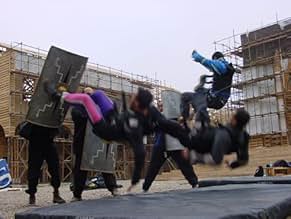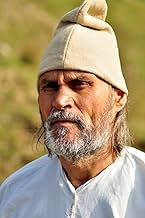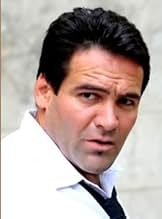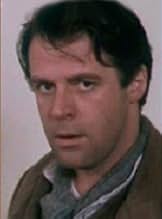Füge eine Handlung in deiner Sprache hinzuBoudica, the Warrior Queen on Britain, leads her tribe into rebellion against the Roman Empire and the mad Emperor of Rome Nero.Boudica, the Warrior Queen on Britain, leads her tribe into rebellion against the Roman Empire and the mad Emperor of Rome Nero.Boudica, the Warrior Queen on Britain, leads her tribe into rebellion against the Roman Empire and the mad Emperor of Rome Nero.
- Iceni Mother
- (as Cristina Serban)
- Iceni Warrior
- (as Alin Olteanu)
Empfohlene Bewertungen
I actually liked the main player, Alex Kingston. I didn't watch ER, so I have no preconceptions about her. I liked most of the actors. I think the problem does not lie with the actors, but the script and this appalling need to make things relevant. It can be done, but it doesn't have to be done, and it was done badly here.
It would have been far more interesting to have a scene where Boudicca uses divination with a rabbit as described in Dio or show the statue of Victory fall rather than the statue of the Roman emperor. Both the Britons and the Romans were very prone to omens and portents. I suppose they thought the audience would not get it. Hello, that's what good writing does! Explains things we don't know.
I didn't mind the accents. We all know the Roman generals and emperors spoke with upper class British accents! We saw Lawrence Olivier in "Spartacus." We watched "I, Claudius.";)
I liked that they had the Britons lime their hair and paint up with woad, but costuming needed to be brighter and jewelry needed to be richer. However, this seems to be a general trend among costumers in film/television; they think that ancient peoples dressed dully. In fact, most ancient peoples dressed in brilliant colors. Positively garish by our standards. They did have Boudicca & her husband dress a little better when they meet Emperor Claudius. In fact, they look like a color drawing straight out of a costume book I have. However, a king and queen of a people would be far better dressed in this.
As for caricature of Nero, the Roman writers don't seem all that fond of him, either. I knew before I watched this how Boudicca died, so I assumed (wrongly perhaps) that they simply didn't show it. However Tacitus says she took poisoned and died. Dio says she got sick and died. The fate of her daughters is not mentioned by either. And they have no names either.
I wasn't expecting exact history here. Or a documentary. I was expecting a really good historical adventure and romp. It is better than other attempts at ancient Celtic-Roman stories. But it would have been far better if the writers had stuck closer to Roman accounts and stopped trying to brain us with relevancy.
All my life I have had a special interest in ancient Celtic culture and lifestyle and a particular fascination for 1st century Britain. Therefore i have done a great lot of research over the years and read and watch anything I can find on the subject.
"Boudica" was probably the worst historical film ever made and could easily enter the Guinness Book of Records for the most historical inaccuracies, both in number and variety, ever seen on a screen. Apart from the swords (where were the shields?), chariots and some of the women's hairstyles there was absolutely nothing right. i know it wasn't meant to be a comedy, but there are some utterly hilarious lines in this film.
Female leaders were very common in ancient Celtic society. Boudica was probably the ruling queen of her tribe anyway, but the Romans only accepted a man in that position and made Boudica's husband (who was much older than her and died of old age, not headaches!) the client king. There were a number of warrior women in 1st century Britain, though Boudica was the only one mentioned in history. Tacitus writes that to the Romans "the worst humiliation of losing the battle with Boudica, was being defeated by a woman!"
Tacitus, although on the other side, describes the British tribes and some of their customs and clothes in some detail. The producers of the film obviously haven't read any of that, or the actors and actresses would at least have worn costumes and hairstyles more appropriate for the period. Women always wore dresses, even in battle! The minor warriors wore very little, while the aristocracy dressed up to impress for the occasion with lots of (mainly gold) jewellery and colourful clothes. The women wore two piece dresses - a wide shirt of linen or wool held together in the middle by an elborate belt, and a full skirt. When horse riding, the skirt was pulled through between the legs, still covering the knees. Cloaks made of wool or fur were worn in the winter, and woollen leggings resembling leg warmers. The men wore similar shirts and cloaks, and breeches which were wide at the top. In the film they wore 20th century jogging bottoms and some sort of cavemen's furs reminding of the "Flintstones".
The men's 20th century hairstyles, I would think, would have looked out of place, even to anyone who never read anything about the 1st century. Almost all of them had their hair too short and where were their moustaches? Here, instead, some of the Romans have (very modern) beards, they would not have had in that period. Most Celtic men, especially those of any standing in society, had moustaches and a long mane of hair. Similar to some Native American tribes, 1st century Britons took pride in their long thick hair. Baldness was seen as a curse by the gods, so never in a million years would there have been a bald priest, and never would a druid or a priest of any sort have worn such rags! The Roman women are dressed up to the nines, although tacky and pantomine like. The Celtic women, and men, would have been dressed up elaborately.
Alright, we don't know the names of Boudica's daughters, though they wouldn't have come out of Arthurian legends or even Wagner. They could have read some ancient Welsh legends and picked some simple names from those.
A Celtic king who didn't want to go into battle would have been deposed, possibly murdered by his people for cowardice. There were no retired warriors anymore than bald priests in rags.
Claudius is hilarious. These scenes reminded me of a cross between "I Claudius" and the "Carry-on" films.
"Acts of Terrorism"? "Peace Process"? President Bush was here - did anyone recognise him?
Celtic funeral rites varied depending on the tribe. However, they never burned their dead. In fact, they went through a lot of trouble to rescue both the dead and the living from the flames, when any of their dwelling places was set on fire by an enemy. Any warrior of rank, especially a king, would have been buried with his sword, jewellery, food, sometimes other weapons or even a chariot. Their graves were usually in a wood and not marked on the outside. I won't go into too much detail here, not even sure you're still reading this. Death by fire was the ultimate punishment (only given to worst criminals), as there was a general belief that it would destroy the soul as well as the body and prevent the person from being reborn. I think there may have been a mix up with a Viking burial here, looking at the flames and water.
"Empire under new management!" another 20th/21st century phrase. "Read my lips!"
The Celtic aristocracy did not live in villages, but in hillside towns. They kept their homes and themselves clean, their hair, bodies and clothes washed regularly. There would not have been an army of the great unwashed, at least not before the battle. In fact, the Celts invented soap.
The Greeks visited Britain before the Romans, not to invade but just to trade, and there are some descriptions of their customs, looks and music. Music was distinctive and melodeous. Singing and playing instruments and dancing was a way of expressing high emotions. They had harps, though not those we know today, a variety of pipes, flutes and drums. We don't know their tunes, though some might have been similar to early medieval or middle eastern type music rather than new age pseudo Native American dirges used in the film.
The "Excalibur" type magic doesn't work here, only making the whole thing more ridiculous.
We are not sure what sort of music they had in the 1st century, but we know that music, poetry and storytelling was an important part of Celtic culture. Singing, dancing and playing instruments expressed their high emotions. They had harps, though not those we know today, a variety of pipes and flutes and drums. Middle Eastern or early medieval type tunes may have been similar, or at least would have fitted into a proper historical film, instead of some weird new age pseudo Native American wailings. I think I heard a didgeridoo once as well, but by then nothing could shock or surprise me anymore.
"What the hell is going on?" Nero said. What is a Classic battle? Then someone mentioned Anglesey! The island was called Ynis Mon, still known by that name in Wales today. The Romans always took a local name and latinised it, therefore called it Mona. The Angles occupied the island five centuries later and called it Anglesey! The producers wouldn't even need to read about this, but could have asked any Welsh person the right name.
The Romans drank from metal tankards and pottery cups, not glasses, as far as I know. Well, certainly not Art Deco glasses.
i don't think the Britons grew cabbages either, maybe mushrooms though I don't know. Their diet consisted mainly of meat, cheese, bread, cakes and apples and berries, maybe some leaves were used as vegetable garnish. Herbs were used in medicine rather than cooking.
Well, I just had to get this off my chest, even if no-one reads it.
Sincerely,
Kersty Evans
I don't suppose anyone could tell me the reason why all the Roman soldiers have cockney accents either.
To watch this film, you've got to have a sense of humor for the dialogue which is utterly painful. The Romans are written so badly on such a deep level one can take amusement in it. But it can't be described, laughed at, and appreciated as a bad B-movie, there are quality stirring dramatic moments there and any humor you see in it is killed by the prolonged gang rape scene, which is not a gratuitous addition but a serious, fundamental part of the historical accounts of the real Boudicca.
This film is without compare in its strengths and weaknesses and I'm wholly at a loss to classify it or say exactly how one should appreciate it. You will have to decide for yourself and tell me.
Wusstest du schon
- WissenswertesFight director Roberta Brown and technical advisor Chris Halstead trained Alex Kingston in sword-fighting and riding a chariot in the suburban neighborhood of Los Angeles. But during training, a policeman arrived. Alex Kingston explained about Boudica, and the policeman, who liked to research historical figures, was impressed asked when Boudica would be on television, and allowed them to continue training.
- Zitate
Boudica: Romans, you are damned. You have awakened the terrible anger of our gods and ancestors, and they will show you no mercy. We will crush your bones into the land you have desecrated. We will slit your veins and watch the blood burst from you and shower down upon our soil. We will swallow you up. And our strong green shoots will spring to life where you once stood.
[pause]
Boudica: See your gods tremble and fall before the wrath of Boudica!
- VerbindungenFeatured in The Story of the Costume Drama: A Call to Arms (2008)
Top-Auswahl
Details
- Erscheinungsdatum
- Herkunftsländer
- Sprache
- Auch bekannt als
- Die Tochter des Spartacus
- Drehorte
- Boudica statue, Westminster Bridge, Westminster, London, England, Vereinigtes Königreich(closing scenes in modern day London)
- Produktionsfirmen
- Weitere beteiligte Unternehmen bei IMDbPro anzeigen
Box Office
- Weltweiter Bruttoertrag
- 10.478 $
- Laufzeit1 Stunde 39 Minuten
- Farbe
- Seitenverhältnis
- 1.78 : 1
Zu dieser Seite beitragen









































